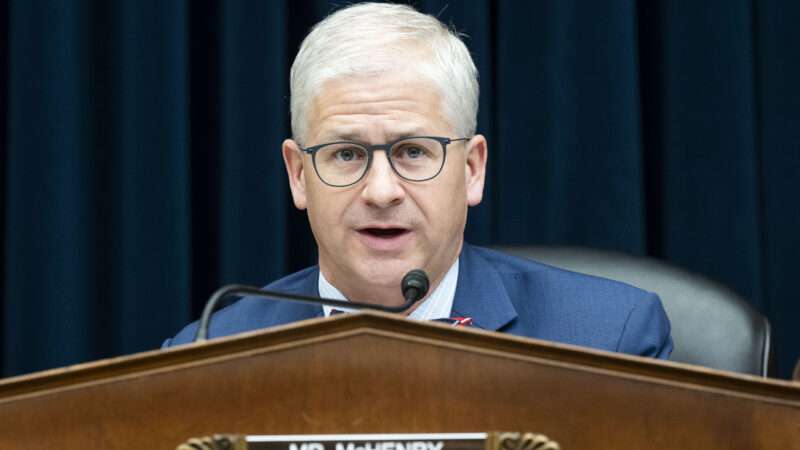
A bipartisan group of lawmakers support limiting the ability of American citizens to invest in Chinese companies. A small group of Republicans, meanwhile, is advocating a more measured approach.
On November 20, over 40 U.S. lawmakers—including Sens. Marco Rubio (R–Fla.), Debbie Stabenow (D–Mich.), and Angus King (I–Maine)—signed a letter to the ranking members of both the House and Senate Armed Services Committees.
"We are deeply concerned," the letter read, "about the potential national security threats posed by outbound capital flows and knowledge transfer to the United States' adversaries," namely China. "There is strong bipartisan consensus in both the U.S. Senate and the U.S. House of Representatives that Congress must act to address the national security threat posed by these outbound investments."
To that end, the signers hoped the 2024 National Defense Authorization Act (NDAA)—the annual must-pass legislation that funds the various components of the national security apparatus, from paying soldiers to maintaining the nuclear stockpile—would include a provision that addressed their concerns.
The Senate passed its version of the NDAA in July, though it seems unlikely the House will pass the same version untouched. The Senate bill included Amendment 931, which the chamber accepted by a 91–6 vote. Under the terms of the amendment, any U.S. citizen or company investing in sectors like semiconductors, satellites, or artificial intelligence in a "country of concern" (like China) would have to provide written notification of the transaction to the Secretary of the Treasury at least two weeks in advance.
The bipartisan letter asked that the NDAA include language that addresses outbound investments in China "and ideally strengthen the language." It mentioned Amendment 931 as well as Executive Order 14105, issued by President Joe Biden in August, which declared "a national emergency to deal with this threat"—that threat being the "advancement by countries of concern in sensitive technologies and products critical for the military, intelligence, surveillance, or cyber-enabled capabilities."
The bipartisan letter noted, seemingly positively, that the executive order "goes beyond notification to consider prohibition of investment in some sectors."
While the Treasury Department's Committee on Foreign Investment in the United States (CFIUS) reviews investments made in the U.S. by foreign nationals, Biden's executive order wants regulations going in the other direction, to potentially limit Americans' investments in foreign countries. As Reason's Eric Boehm reported at the time, "There are only two other countries—South Korea and Taiwan—that have outbound investment screening systems."
At the congressional level, the proposal is currently being held up by Rep. Patrick McHenry (R–N.C.), chairman of the House Financial Services Committee who briefly served as House Speaker Pro Tempore in October. As Bloomberg reported this week, "McHenry, who has long opposed broad investment restrictions in favor of an approach that targets individual companies," is "effectively blocking" the measure's inclusion in the House's version of the NDAA.
In a September 27 letter to Treasury Secretary Janet Yellen, McHenry expressed relief that the "scope" of Biden's executive order was "less broad than some had anticipated" but nevertheless felt the administration's policy was "arbitrary, relies on baseless assumptions, and in certain places is incoherent."
"If we oppose China's state-run economy, we want more private investment – not less," McHenry wrote. "Of those private investors, we want more of them to be Americans – not fewer."
McHenry has a point. "We should be targeting specific companies rather than imposing blanket restrictions," says Clark Packard, a research fellow at the Cato Institute's Herbert A. Stiefel Center for Trade Policy Studies.
"Broadly speaking, I don't think Americans should be investing in companies that make equipment used to surveil and further repress Uyghurs," Packard added, pointing to an April Axios report that said cameras made by Chinese-owned surveillance firm Hikvision have been used to surveil Uyghurs, the Muslim minority population that has been subjected to a campaign of authoritarian repression by the Chinese government.
Outright bans on investment would be a bridge too far, even for a country like China with such a dismal human rights record, and could even backfire. Rep. Andy Barr (R–Ky.), who serves with McHenry on the House Financial Services Committee, tweeted that the proposed regulations "would inadvertently bolster [Chinese President] Xi Jinping's goal to block American influence in the Chinese market." Barr added, "It's crucial we find the right balance in safeguarding American influence and intelligence without creating unnecessary bureaucracy."
Last week, Ian Allen at Just Security wrote that the proposed rules could also lead other nations, including allies and trading partners, to adopt restrictions of their own, in turn. "Overly restrictive measures risk impediments to global technological advancement, blowback for domestic industries, and high administrative costs (which are projected to reach $10 million simply to start the program)," Allen warns.
Besides, there is reason to suspect that a more measured approach is warranted. "Foreign direct investment in China turned negative during the 3rd quarter of 2023 – for the first time on record," Packard added. "In other words, more capital flowed out of China than into China in the 3rd quarter of 2023. Likewise, between 2014 and 2020, foreign direct investment from G7 countries into China fell by about half." Industrialized nations are turning their backs on an increasingly illiberal China.
Just like targeted sanctions, Congress can designate certain companies that are particularly objectionable to be off-limits, while allowing Americans the freedom to otherwise use their money as they see fit. On the other hand, an all-encompassing ban as has been proposed by members of both major parties would be too aggressive and could even risk escalating tensions with the world's second-largest economy.
The post Both Parties Agree: It's the Government's Business Whether You Invest in Chinese Companies appeared first on Reason.com.







